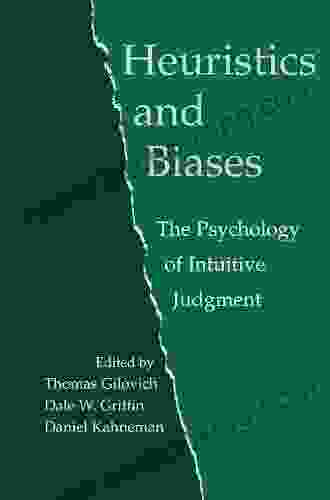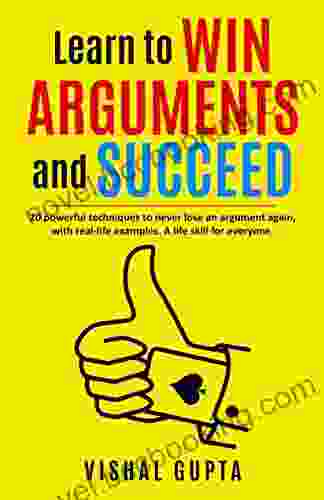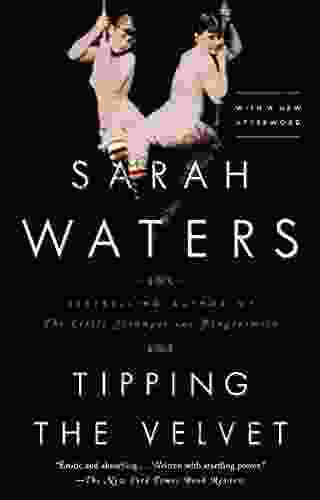The Psychology of Intuitive Judgment: Unveiling the Inner Workings of Our Gut Feelings

When we make decisions, we often rely on our gut feeling, that seemingly inexplicable hunch that guides our actions. This phenomenon, known as intuitive judgment, has long fascinated philosophers, psychologists, and neuroscientists alike. In recent years, scientific research has shed new light on the nature and workings of intuitive judgment, revealing its complex interplay with our conscious and subconscious minds.
4.6 out of 5
| Language | : | English |
| Text-to-Speech | : | Enabled |
| Enhanced typesetting | : | Enabled |
| Word Wise | : | Enabled |
| Print length | : | 881 pages |
| File size | : | 11226 KB |
| Screen Reader | : | Supported |
The Nature of Intuitive Judgment
Intuitive judgment is a form of decision-making that occurs quickly and automatically, without conscious deliberation. It is often characterized by a feeling of certainty or conviction, even in the absence of clear evidence. Examples of intuitive judgment include making a snap decision about whether to trust someone, deciding which job offer to accept, or choosing a partner.
The Role of the Subconscious Mind
Research suggests that intuitive judgment is largely driven by the subconscious mind. Our subconscious mind processes vast amounts of information, both consciously and unconsciously, and it uses this information to form associations and patterns. When we encounter a situation that is similar to one we have experienced in the past, our subconscious mind may quickly retrieve the associated information and suggest a course of action. This process happens so rapidly that it often feels like an intuitive hunch.
The Influence of Implicit Memory
Implicit memory is a type of memory that stores information and skills that we are not consciously aware of. These memories are formed through repetition and experience, and they can influence our behavior and decision-making without us even realizing it. For example, if we have had a bad experience with a certain type of person, we may subconsciously avoid interacting with people who resemble that person, even if we cannot consciously recall the negative experience.
The Importance of Emotional Intelligence
Emotional intelligence is the ability to understand and manage our own emotions, as well as the emotions of others. People with high emotional intelligence are better able to make intuitive judgments because they can more accurately perceive and interpret the emotions of those around them. This allows them to make decisions that are in line with their values and goals.
The Use of Heuristics and Biases
Heuristics are mental shortcuts that we use to make decisions quickly and efficiently. While heuristics can be helpful, they can also lead to biases, which are systematic errors in thinking that can influence our judgment. For example, the availability heuristic leads us to believe that events that are more easily recalled are more likely to occur, even if this is not the case.
The Practical Implications of Intuitive Judgment
Understanding the psychology of intuitive judgment has a number of practical implications. For example, it can help us to:
* Make better decisions by recognizing the role of our subconscious mind and implicit memory. * Avoid biases by being aware of the mental shortcuts we use and the situations in which they are most likely to lead us astray. * Develop our emotional intelligence by practicing mindfulness and empathy. * Trust our gut feelings when we have a strong sense of conviction, but be willing to reconsider our decisions if new information comes to light.
Intuitive judgment is a complex and fascinating phenomenon that plays a significant role in our lives. By understanding the psychology behind intuitive judgment, we can make more informed decisions, avoid biases, and develop our ability to navigate the world around us effectively. So the next time you have a gut feeling, don't ignore it. Embrace it as a valuable source of information and insight.
4.6 out of 5
| Language | : | English |
| Text-to-Speech | : | Enabled |
| Enhanced typesetting | : | Enabled |
| Word Wise | : | Enabled |
| Print length | : | 881 pages |
| File size | : | 11226 KB |
| Screen Reader | : | Supported |
Do you want to contribute by writing guest posts on this blog?
Please contact us and send us a resume of previous articles that you have written.
 Book
Book Novel
Novel Page
Page Chapter
Chapter Text
Text Story
Story Genre
Genre Reader
Reader Library
Library Paperback
Paperback E-book
E-book Magazine
Magazine Newspaper
Newspaper Paragraph
Paragraph Sentence
Sentence Bookmark
Bookmark Shelf
Shelf Glossary
Glossary Bibliography
Bibliography Foreword
Foreword Preface
Preface Synopsis
Synopsis Annotation
Annotation Footnote
Footnote Manuscript
Manuscript Scroll
Scroll Codex
Codex Tome
Tome Bestseller
Bestseller Classics
Classics Library card
Library card Narrative
Narrative Biography
Biography Autobiography
Autobiography Memoir
Memoir Reference
Reference Encyclopedia
Encyclopedia Robert Bailey
Robert Bailey Robert James Jacobi
Robert James Jacobi Rod Franchi
Rod Franchi Ryan Dunlavey
Ryan Dunlavey Tony Blackman
Tony Blackman Russell Napier
Russell Napier Roya Hakakian
Roya Hakakian Sarah Pye
Sarah Pye Sara Bowton
Sara Bowton Rochelle Spencer
Rochelle Spencer Rolf Giesen
Rolf Giesen Rosalyn Hoffman
Rosalyn Hoffman Steve Forbes
Steve Forbes Sanjeev Agrawal
Sanjeev Agrawal Rich Karlgaard
Rich Karlgaard Ray Grillo
Ray Grillo Steve Economides
Steve Economides Rick Hillier
Rick Hillier Raza Imam
Raza Imam Rajiv Sarma
Rajiv Sarma
Light bulbAdvertise smarter! Our strategic ad space ensures maximum exposure. Reserve your spot today!
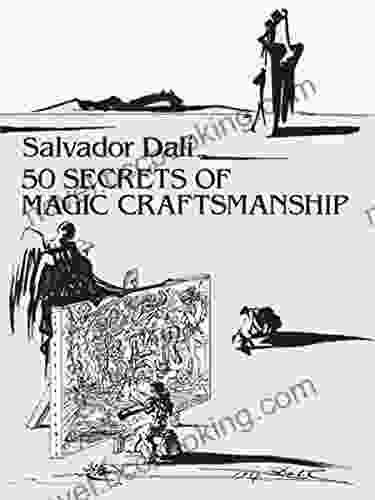
 Stanley BellUnveiling the Enchanting Secrets of Magic Craftsmanship: A Journey through...
Stanley BellUnveiling the Enchanting Secrets of Magic Craftsmanship: A Journey through...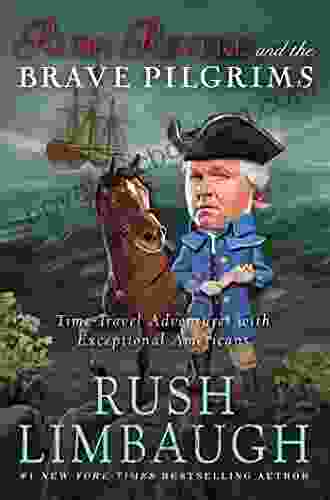
 Jayson PowellTime Travel Adventures With Exceptional Americans: Embark on an Unforgettable...
Jayson PowellTime Travel Adventures With Exceptional Americans: Embark on an Unforgettable... Yasushi InoueFollow ·4.3k
Yasushi InoueFollow ·4.3k J.R.R. TolkienFollow ·10.5k
J.R.R. TolkienFollow ·10.5k Joseph ConradFollow ·19.6k
Joseph ConradFollow ·19.6k Nathaniel PowellFollow ·11.8k
Nathaniel PowellFollow ·11.8k George Bernard ShawFollow ·7.7k
George Bernard ShawFollow ·7.7k Wesley ReedFollow ·3.6k
Wesley ReedFollow ·3.6k Austin FordFollow ·12.2k
Austin FordFollow ·12.2k Aldous HuxleyFollow ·16.7k
Aldous HuxleyFollow ·16.7k

 Steven Hayes
Steven HayesEmbark on Unforgettable Adventures: Discover the Best of...
Unveiling the Enchanting Trails of the...
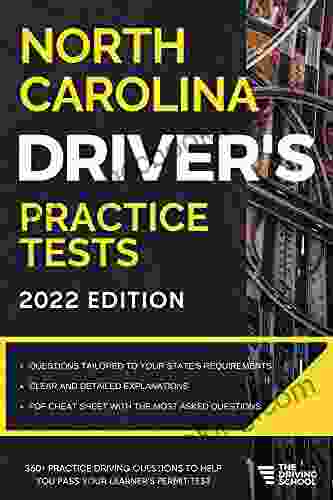
 Jarrett Blair
Jarrett BlairMaster the Road: Ace Your North Carolina Driver's Test...
Unlock the Secrets to...
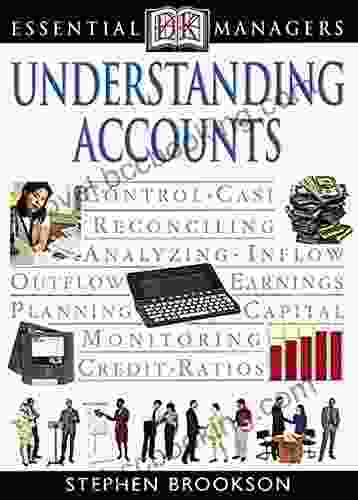
 Brent Foster
Brent FosterDk Essential Managers Understanding Accounts: Your...
In today's...

 Isaac Mitchell
Isaac MitchellPrognosis: A Memoir of My Brain - A Journey of Hope and...
In 2013, Eve Ensler was diagnosed with a...
4.6 out of 5
| Language | : | English |
| Text-to-Speech | : | Enabled |
| Enhanced typesetting | : | Enabled |
| Word Wise | : | Enabled |
| Print length | : | 881 pages |
| File size | : | 11226 KB |
| Screen Reader | : | Supported |


